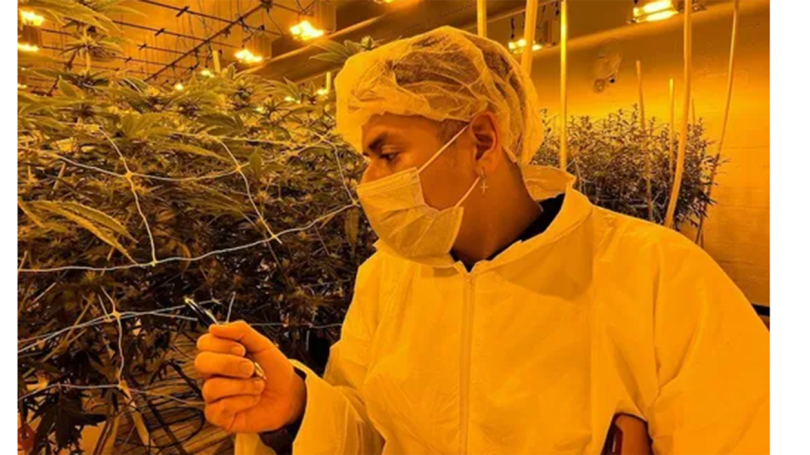Dartmouth Engineering Students Conduct First-of-its-Kind Independent Study on Energy Efficiency in Cannabis Cultivation

August 31, 2022
Dartmouth’s Thayer School of Engineering and Arthur L. Irving Institute for Energy and Society today announced the results of the first-ever independent study on energy efficiency in the cannabis industry. The study was sponsored by the Sustainable Cannabis Coalition and also supported by Rocky Mountain Institute and seasoned building science engineers. These staggering results were based on data collected from MariMed Inc. (OTCQX:MRMD), a leading multi-state cannabis operator based in Norwood, MA, and Culta, a Maryland-based vertically integrated seed-to-sale cannabis company offering indoor and outdoor-grown cannabis and accessories.
A team of six senior engineering students conducted research through the Cook Engineering Design Center (CEDC) at Dartmouth over a six-month period during the 2021–22 academic year, adopting a whole system approach to meet plant and grower needs by focusing on yield per unit of energy, cost, and carbon emission. This research will ultimately provide regulators and industry operators with key insights into how the cannabis industry can meet climate, grid, and energy goals while improving business operations and cost targets.
“This research provides an independent, fact-based analysis of the enormous potential for the cannabis industry to reduce both capital and operating costs while improving key metrics like grams of product per kilowatt hour of energy and grams of product per grams of CO2 emission,” said Dr. Stephen Doig, Senior Research and Strategy Advisor at the Irving Institute.
“The students found that operators using LED lights can reduce energy use by 50% with even greater savings for those using HPS systems. Even larger savings are likely available to the indoor cannabis industry overall since the scant data available suggests that industry-wide energy use intensity is 2-3X higher than the optimal minimum conditions needed for robust product production.”
Dr. Stephen Doig
The students’ adapted methodology pioneered at Rocky Mountain Institute (RMI) by understanding the key needs of the plants (light, temperature, VPD, water) for optimal production. They also took into consideration that plant needs change over the growth cycle and that heating and humidity loads can vary by 10-fold across the day-night cycle. The team explored active and passive options to meet those needs dynamically and grounded their analysis by fully metering grow lights, humidity, and temperature control systems. The study yielded significant results, including:
- Under “optimal minimum” conditions, HVAC systems can reduce fan energy by 50% during the light cycle and 90% during the dark cycle especially if a displacement ventilation approach to humidity control is adopted.
- Using the best LED lights can reduce cooling needs by 10% compared to average LEDs and by 30+% compared to HPS.
- The students also demonstrated that using air-side economizers (free outdoor air cooling) could further reduce mechanical cooling needs by an additional 40+% depending on facility location. Free cooling is a standard practice in the building industry today (and code in many states).
“Regulators and grid operators should applaud the results since widespread industry adoption will lower peak demand on the grid and provide guidance on key metrics to compare operators across the industry,” said Dr. Doig.
To allay fears of contamination from the outdoors the students pointed out that industries highly sensitive to contamination like pharmaceuticals and semiconductors use filtration to manage contamination levels. While the study did not address capital costs in detail the results suggest that growers who adopt an optimal minimum approach will save capital as well as operating costs since HVAC systems will be smaller and/or there will be fewer of them for the same yields.
“We were incredibly impressed by the knowledge, passion, and commitment of the Dartmouth students and faculty involved in the study, and thankful for the opportunity to participate,” said Tim Shaw, COO of MariMed. “As a company committed to improving people’s lives every day, we take our responsibility to help create a cleaner environment very seriously. Implementing Dartmouth’s recommendation to redesign cooling and dehumidification implementation and to install even higher-efficiency LED lighting in our facilities is just one of many initiatives we are considering as part of our sustainability efforts at MariMed.”
The Sustainable Cannabis Coalition in partnership with RMI, Dartmouth, and other key industry players intends to conduct further research in the 2022–23 academic year.
“Based on the success of this initiative, we are looking forward to extending the work with Dartmouth into additional new-build opportunities, retrofits, and developing consistent industry metrics for energy efficiency and GHG’s,” said Shawn Cooney, co-founder of the Sustainable Cannabis Coalition. “Our members are eager to participate in the process of standardizing the way our industry approaches its use of resources. We need to measure our usage of scarce resources across all phases of our product’s life cycles.”
SCC members and partners, Culta, Byers Scientific, Anderson Porter Design, Valiant, Sustain.Life, Fluence, and Inspire also participated in the research, providing additional information to the Dartmouth team.
Photo: Dartmouth Engineering student Jason Carpio ’22 Th’22 conducts research at Culta for his team’s project: “Radically Efficient Cannabis Cultivation Facility.” Additional team members: Jack Firestone Th’22, Clara Hahn ’22 Th’22, Griffin Lehman ’22, Grace Qu ’22 Th’22, Ivy Yan ’22 Th’22. (Photo courtesy of Dartmouth Student Sustainable Cannabis Team.)





![Guide to the Canadian Electrical Code, Part 1[i], 26th Edition– A Road Map: Section 56](https://electricalindustry.ca/wp-content/uploads/2022/11/Guide-CE-Code-2-768x432.png)




![Guide to the Canadian Electrical Code, Part 1[i], 26th Edition– A Road Map: Section 56](https://electricalindustry.ca/wp-content/uploads/2022/11/Guide-CE-Code-2.png)



